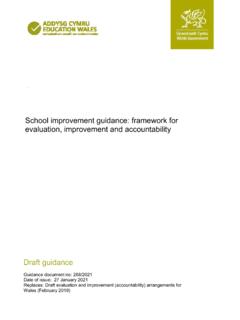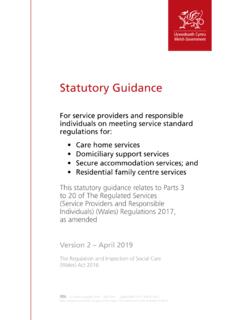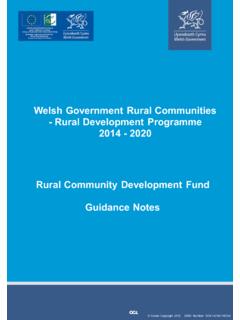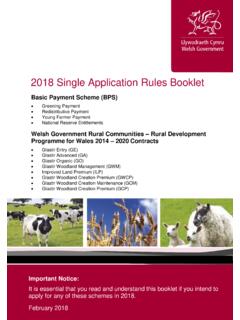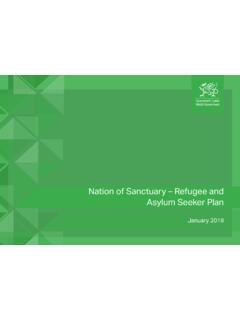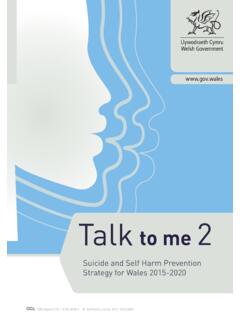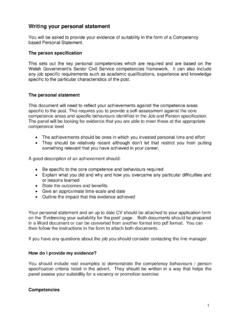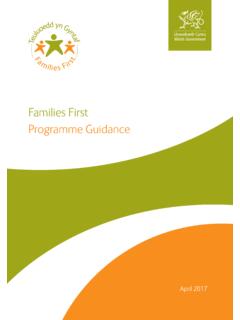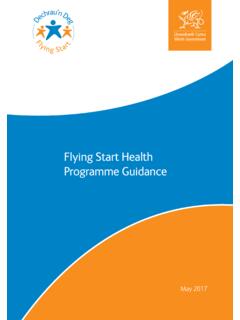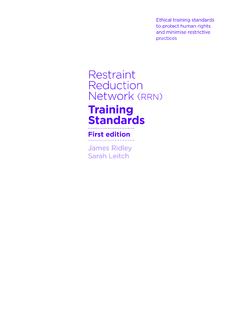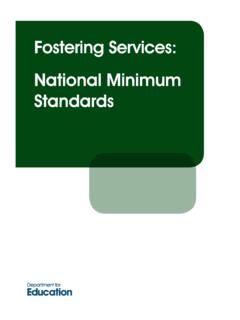Transcription of Reducing Restrictive Practices Framework
1 1 | Delivering Hospital to Home Services Crown copyright 2021 WG42973 Digital ISBN: 978-1-80195-650-5 Reducing Restrictive Practices FrameworkA Framework to promote measures and practice that will lead to the reduction of Restrictive Practices in childcare, education, health and social care settings for people of all Reducing Restrictive Practices Framework Contents Introduction Page 5 Chapter 1 Page 9 The human rights Framework for the reduction of Restrictive Practices Chapter 2 Page 11 Approaches to support effective person centred practice Chapter 3 Page 13 Restrictive Practices Chapter 4 Page 19 Working to reduce Restrictive Practices 3 This Framework is applicable across childcare, education, health and social care settings and sectors.
2 Therefore some generic terms are used throughout the policy. Person centred: When we use the term person centred this also means child centred for children . Person or people: When we use the terms person or people this includes all children (up to the age of 18 years) and adults (age of 18 years or over). Restrictive Practices : Restrictive Practices are a wide range of activities that stop individuals from doing things that they want to do or encourages them to do things that they don t want to do. They can be very obvious or very subtle. (Care Council for Wales, 2016)1 This term covers a wide range of activities that restrict people. It includes: physical restraint chemical restraint environmental restraint mechanical restraint seclusion or enforced isolation long term segregation coercion Challenging behaviour/behaviour which challenges: Behaviour can be described as challenging when it is of such an intensity, frequency or duration as to threaten the quality of life and/or the physical safety of the individual or others and is likely to lead to responses that are Restrictive , aversive or result in exclusion.
3 (Royal College of Psychiatrists, British Psychological Society and Royal College of Speech and Language Therapists, 2007).2 Personal Plan: In this Framework the term personal plan includes a care and support plan, care and treatment plan, plan for a child in a childcare setting and/or individual education 1 Individual education plans can be provided as part of current arrangements under the Special Educational Needs Code of Practice for Wales. These arrangements will be replaced as part of the phased implementation of individual development plans under the Additional Learning Needs and Education Tribunal (Wales) Act 2018. This Framework is intended to inform practice in relation to individual education plans where they exist under current arrangements and individual development plans under new arrangements as they are implemented.
4 4 Practitioners: When we refer to practitioners, we mean all people who are paid to work with people in childcare, education, social care and health settings, including agency or sessional workers. For the purposes of this Framework the term practitioners also includes foster carers, adult placement carers and registered child minders but not unpaid carers. 5 Introduction 1. This Framework is intended to promote measures that will lead to the reduction of Restrictive Practices . The Framework also seeks to ensure that where Restrictive Practices are used, as a last resort , to prevent harm to the individual or others, that this is informed by person centred planning, within the context of the service setting and in a way which safeguards the individual, those whom they interact with, and those who provide services to them.
5 2. In order to achieve the aims of this Framework , organisations should have a threefold focus: Preventing the necessity for Restrictive practice through the development of reduction strategies and through the promotion of a human rights approach. Working with individuals through person centred planning to meet individual needs in a way that actively reduces the likelihood of situations arising where Restrictive Practices are used as a last resort. Having measures in place so that when situations arise where Restrictive practice are used as a last resort, to prevent harm to the individual or others, there is prior planning and training in place to secure the safety of all concerned. Purpose of Framework 3. The Welsh Government considers that the guidance it issues on Restrictive Practices should ensure that those who work with children and adults in childcare, health, education and social care settings share a common Framework of principles and expectations informed by an approach that actively promotes human rights.
6 4. The Welsh Government is clear that the use of Restrictive Practices should be within the context of the European Convention on Human Rights and in line with the principles described in the Human Rights Framework on Restraint produced by the Equality and Human Rights 5. The approach set out in this Framework seeks to promote the rights and principles set out in the United Nations Convention on the Rights of the Child (UNCRC); United Nations Principles for Older Persons and the United Nations Convention on the Rights of Persons with Disabilities. 6. The Framework is intended to inform commissioners of services and service providers, who should refer to the Framework when drafting policies and procedures, reviewing current arrangements and arranging or commissioning training. The Framework does not advise on individual actions required in 6 specific circumstances or specific service settings, nor does it recommend specific methods of Restrictive practice.
7 7. This Framework is non-statutory however; it sets out the Welsh Government s expectations for policy and practice in Reducing Restrictive Practices across childcare, education, health and social care settings as part of a person centred approach. As such the Inspectorates: Estyn; Healthcare Inspectorate Wales and Care Inspectorate Wales will consider compliance with the approach set out in the Framework when they carry out inspections. 8. The Welsh Government recognises that Restrictive Practices have a negative impact on the well-being of those people subject to these Practices , as well as those who implement and witness them. This may include physical harm, trauma or re-traumatisation. Restrictive Practices should only ever be used as a last resort and should only be used where there is a real possibility of harm to the individual or to others.
8 9. This Framework replaces the Framework for Restrictive Physical Intervention, Policy and Practice (Welsh Assembly Government, 2005). Relevant Legislation and policy Special Educational Needs Code of Practice for Wales (Welsh Government, 2004) Mental Capacity Act, 2005 Equality Act, 2010 The Public Sector Equality Duty, Equality Act 2010 (EA 2010) s149 The Child Minding and Day Care (Wales) (as amended) Regulations 2010 Together for Mental Health (Welsh Government, 2012) Practical approaches to behaviour management in the classroom: A handbook for classroom teachers in primary schools (Welsh Government, 2012) Safe and Effective Intervention - Use of Reasonable Force and Searching for Weapons (Welsh Government Guidance, 2013) The Social Services and Well-being (Wales) Act 2014 Part 4 Code of Practice (Meeting Needs), Social Services and Well- being (Wales) Act 2014 (Welsh Government, 2015) National Minimum Standards for Regulated Childcare for children up to the age of 12 years (Welsh Government, 2016) Working Together to Safeguard People Volume 1: Introduction and Overview (Welsh Government, 2016) Mental Health Act 1983.
9 Code of Practice for Wales (Welsh Government, 2016) Mental Health Units (Use of Force) Act , 2018 The Learning Disability Improving Lives Programme (Welsh Government, 2018a) Working Together to Safeguard People Volume 5: Handling Individual Cases to Protect children at Risk (Welsh Government, 2018) 7 Working Together to Safeguard People Volume 6: Handling Individual Cases to Protect Adults at Risk (Welsh Government, 2018) Dementia Action Plan for Wales (Welsh Government, 2018) Additional Learning Needs and Education Tribunal (Wales) Act 2018 (as requirements come into force) Additional Learning Needs Code (as requirements come into force) Regulation and Inspection of Social Care (Wales) Act 2016 Statutory Guidance For service providers and responsible individuals on meeting service standard regulations for: Care home services; Domiciliary support services; Secure accommodation services; and Residential family centre services, This statutory guidance relates to Parts 3 to 20 of The Regulated Services (Service Providers and Responsible Individuals) (Wales) Regulations 2017, as amended, (Welsh Government, 2019) 10.
10 This is not an exhaustive list and settings should ensure they are up to date with the statutory requirements placed on them through legislation and guidance. 11. Welsh Government legislation and policy seeks to promote a rights based approach to practice with children and adults. This means involving people in decisions about the support and services they receive and the outcomes they want to achieve. It also means planning to meet needs in a person centred way that promotes wellbeing and the opportunities for individuals to realise their rights. 12. One of the implications of this for practice is the need to plan with, and for, people so that measures are in place to prevent the use of Restrictive Practices . The approach to involving people and the significant people in their lives in planning should be meaningful and appropriate to the age, capacity and communication needs of the individual.
